Alain Attal The Dancer Interview
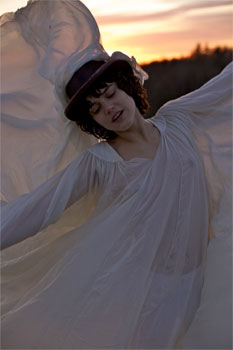
Alain Attal The Dancer Interview
Cast: Soko, Lily-Rose Depp, Gaspard Ulliel, Mélanie Thierry, Louis-Do de Lencquesaing, François DamiensDirector: Stéphanie Di Giusto
Rated: M
Running Time: 112 minutes
Synopsis: Born in the American Midwest, nothing in her background destined farm girl Loïe Fuller to become the toast of Europe's
Belle Epoque cabarets, even less to dance at the Paris Opera.
Hidden behind metres of silk, her arms extended by long wooden rods, Loïe reinvents her body on stage and enthralls her audiences a little more every night with her revolutionary Serpentine dance.
Dazzling the capital, she becomes an icon, the blazing symbol of a generation. Eminent admirers fall at her feet: Toulouse-Lautrec, the Lumière Brothers, Rodin. Even if the physical effort risks destroying her back, even if the glare of the stage lights sears her eyes, she will never falter in the quest to perfect her art. But her meeting with Isadora Duncan – a young prodigy hungry for glory – will lead to the downfall of this icon of the early 20th century…
The remarkable destiny of a modern woman who revolutionised her era.
The Dancer
Release Date: September 28th, 2017
Trailer
www.palacefilms.com.au/thedancer/
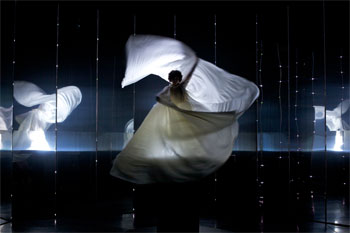 Interview with Alain Attal
Interview with Alain Attal
Question: Stéphanie Di Giusto's The Dancer was a highly ambitious project for a first-time director. What was the attraction for you? Alain Attal: Vincent Maraval, at Wild Bunch, was the first to arouse my interest – he said, 'There are no stars attached, the girl is a first-time director, and it costs a fortune…" So I read the script forewarned, but by the time I reached the end, I was excited. Then my meeting with Stéphanie Di Giusto was key – she was so passionate about her project that she swept me off my feet.
Question: Tell us about your meeting with her.
Alain Attal: She knew where she was going, she had it all mapped out and her 130-page script was already well-developed and wonderfully illustrated. She'd even prepared a supporting dossier with pictures of Loïe Fuller and her specific wants in terms of production design and casting. Stéphanie answered all of my questions very precisely. I could already see her film. In terms of exciting and overflowing creativity and conversation it was probably was one of the best meetings of my professional life.
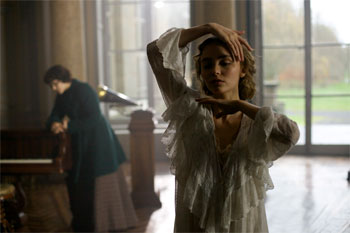 Question: How did you react when she said she wanted to cast Soko as Loïe Fuller?
Question: How did you react when she said she wanted to cast Soko as Loïe Fuller? Alain Attal: With me, the director is the boss. Now, although I'm never intrusive during the casting process, there are things I like and relate to more or less – but to tell you the truth, the choice of Soko was integral to my commitment to the project. I'd already loved her in Alice Winocour's Augustine and Xavier Giannoli's In the Beginning and even in films where she only has a minor role. I liked her being a loose cannon and I found the idea of picking one strong-headed artist to portray another one interesting.
Question: Soko is very famous in indie rock and post-punk circles but not so much in the film industry…
Alain Attal: I was aware that by endorsing Stéphanie's decision, I was making things even more difficult for myself – I would have trouble convincing a TV network to finance an expensive first feature with an actress who was very far from a household name. However I decided to go ahead with the project. My wife Caroline who reads all of my projects and whose opinion I value highly – because she's totally uncompromising – supported me at every turn of this hectic production and her enthusiasm gave me strength.
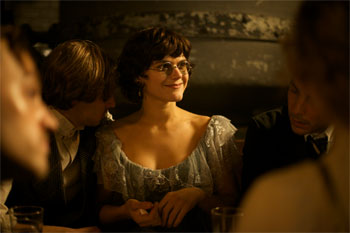 Question: You're known to work very closely with your directors. How was it with Stéphanie Di Giusto?
Question: You're known to work very closely with your directors. How was it with Stéphanie Di Giusto? Alain Attal: We talked a lot and worked a great deal on the script – the supporting characters were a bit underdeveloped and so we fleshed out Mélanie Thierry and Gaspard Ulliel's roles. Stéphanie and I sometimes argued over some scenes, all the more so since she would rewrite portions of the script every day. She must have written 50 different drafts before the final version. It may seem odd but Stéphanie and I often brought up Rocky, a guy who dreams of becoming a world champion and who's willing to sacrifice it all to reach his goal – although he trains in a grungy boxing gym on the outskirts of Philadelphia. The Dancer told the same story with the same references…
She was uncompromising – she absolutely wanted DP Benoît Debie on board and she eventually won him over. She repeatedly flew to L.A., without letting anyone know, to pick the actress – Lily-Rose Depp – who would portray Isadora Duncan. She literally harassed Gaspard Ulliel into signing up for Louis Dorsay's role. And she managed to convince François Damiens to take on the role of the Folies Bergères director, although we couldn't afford him.
Question: How did you put the film together financially? Was it a risky move for Trésor Productions?
Alain Attal: I did take serious risks. I've never exposed my company so much – more than €1.5 million. It's huge – the film cost €8 million and I only raised a little less than 6.5 million.
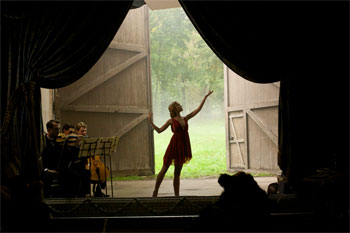 Question: You have a history of embarking on this kind of -crazy' productions…
Question: You have a history of embarking on this kind of -crazy' productions…Alain Attal: I did it on Polisse where 'reasonable" decisions quickly gave way to 'necessary" decisions; on Tell No One where no financier would back the idea of François Cluzet; and most importantly on Radu Mihaileanu's The Concert, which was unquestionably my wildest venture up until The Dancer.
In those cases, you're in a totally schizophrenic position where you want what's best for the film while being aware that you can't afford it. You go into debt, you throw yourself headlong into the project and above all you embrace the director's decisions because you know he or she's right when he or she won't give in. Radu Mihaileanu knew exactly what he needed and, thank God, his film was successful; Stéphanie Di Giusto was just as determined – history will tell if I did the right thing in supporting her all along…
Question: In the end, which partners did you find?
Alain Attal: The CNC that gave an Advance on Receipts, Canal Plus, Ciné +, Wild Bunch Distribution, which also handles world sales, a coproduction with a Czech company, Serena Films, and the Dardenne Brothers. Later on, as the shoot was in progress, Orange Studio came on board for a small coproduction.
Question: One of the key scenes – in which Loïe Fuller performs at the Opera – was challenging both choreographically and cinematically.
Alain Attal: As Stéphanie knew, she had made sure very early on that Jodie Sterling, a choreographer who trained and rehearsed with Soko, would join us. As a result, she was able to focus on the shooting script and the filming of this dancing scene, and the one with all the student dancers in the forest.
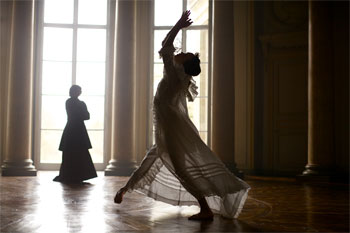 Question: How was it shooting at the Opera?
Question: How was it shooting at the Opera? Alain Attal: It's a state-run institution, so you can't do anything you like – there are many restrictions but it was great wrapping the shoot in that stately setting. Incidentally it's one of the major changes in the script that was originally supposed to take place in Vienna. The fact that the central character was ultimately aiming for the Paris Opera struck a stronger chord. It raises the bar.
Question: You said Stéphanie Di Giusto was uncompromising. Can you give us examples?
Alain Attal: I couldn't afford to fund the scenes where Loïe is out in the mountains in the US, and I thought that the film could begin when she gets to her mother's. Stéphanie was back at it by the end of the shoot: 'Listen," she told me, 'I need these scenes so we'll do them like a short film. Just take it off my wages – I'll pay for it." She was right. I couldn't imagine the film without the scenes she shot in the Vercors region.
She also made a point of having two shots of Soko crossing the Atlantic on a boat that we had to give up on. Last February, she embarked on a ferry with Soko and the producers Marie Jardillier and Emma Javaux that joined forces with me. She did her shots without any permit, just with a camera and Soko. The only restriction I imposed on her was to lose a few shooting hours towards the end – all in all something like 2 days of shooting out of 47. I had the guts to draw the line at this point as the production manager, who was exhausted, couldn't get any compromise on her part.
Question: What was your job during the editing process?
Alain Attal: After eight weeks of editing, Stéphanie called me up: 'I'm done," she said. The version of The Dancer she showed me was 80 minutes long. I've produced 26 films and I've never seen anything like it! It's just the opposite of all directors that always make their films too long. But she was so afraid her film might be too contemplative and overemotional that she's made a real whirlwind. So we picked up from her original rough cut and we started from scratch – I tried to show her that the film could benefit from going slow – can you believe it? – and she went back to work on her film with a greater peace of mind.
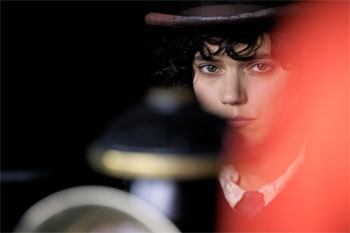 Question: You can feel a lot of connections between the struggle of Loïe Fuller, fighting for the recognition of an art form she came up with, the energy of the young director psyched up about seeing her film through to completion and your own involvement in the project.
Question: You can feel a lot of connections between the struggle of Loïe Fuller, fighting for the recognition of an art form she came up with, the energy of the young director psyched up about seeing her film through to completion and your own involvement in the project. Alain Attal: I'm in no position to analyze these connections. However, I was indeed excited by bringing together the destinies of these two women – the one I was helping make her directing debut and the one of the central character of the film – and by how much they were mirroring each other.
Question: Would you say like Édith Piaf's famous song: 'I regret nothing"?
Alain Attal: I've never felt any regret about the films I've produced and it's definitely not happening with The Dancer…
The Dancer
Release Date: September 28th, 2017
Trailer
www.palacefilms.com.au/thedancer/
MORE
- Mission: Impossible Fallout
- Glenn Close The Wife
- Allison Chhorn Stanley's Mouth Interview
- Benicio Del Toro Sicario: Day of the Soldado
- Dame Judi Dench Tea With The Dames
- Sandra Bullock Ocean's 8
- Chris Pratt Jurassic World: Fallen Kingdom
- Claudia Sangiorgi Dalimore and Michelle Grace...
- Rachel McAdams Disobedience Interview
- Sebastián Lelio and Alessandro Nivola...
- Perri Cummings Trench Interview



